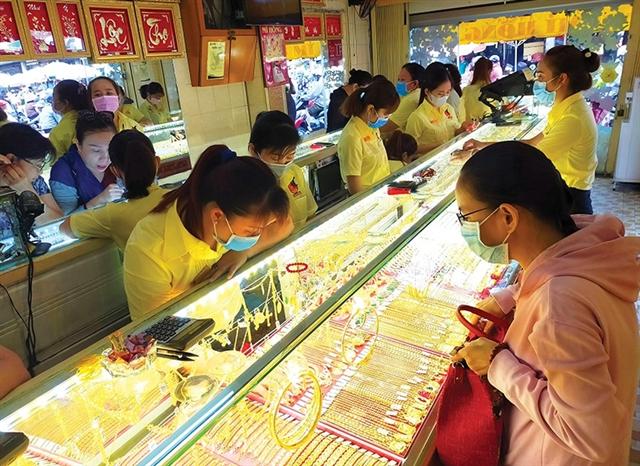Gold’s attributes stand firm in face of a changing world
Gold’s attributes stand firm in face of a changing world
Gold is foremost in the thoughts of many Vietnamese investors as a habitual investment. Andrew Naylor, head of ASEAN at the World Gold Council, writes about Vietnam’s opportunities and barriers as well as the prospects of digitalisation in the gold market.

Andrew Naylor, head of ASEAN at the World Gold Council
|
For many Vietnamese, gold is front of the mind. It is their investment of choice, valued for its safeguarding properties in a country with a history of rampant inflation. But it is more than a commodity – it is thought to impart respect and is valued as a bringer of luck and a reminder of happy times. This is reflected in the fact that aspiration is a far more important driver of investment for the Vietnamese than it is for the global investor.
In our recent research, 72 per cent of Vietnamese investors own gold. Notwithstanding, a lack of investment opportunities creates a real dilemma for the Vietnamese.
Their investment is almost always in physical gold – sometimes worn as jewellery, sometimes carried on their person, sometimes stored at home – and this is a problem. They worry about security and would welcome the chance to buy into investments where gold is vaulted or held by a third party.
Investment choices in Vietnam are limited due to national regulations. Consequently, consumers have less choice and are not able to benefit from contemporary gold investment products, such as digital gold accounts. Opening up and bringing greater transparency to the gold market could reduce smuggling and enhance consumer protection. The government is also keen to persuade investors to support the country’s banks via savings accounts, and with these objectives in mind new plans are afoot to move the industry forward.
Against a backdrop of global turmoil, gold has done well in Vietnam. Already a habitual investment, interest has increased as investors have watched its price climb over recent years. Our research showed that 81 per cent of people who have previously bought gold would do so again, and only 10 per cent say they have no interest in gold.
Gold is seen as a way of protecting wealth and has historically been a hedge against inflation. From 1996 to 2020, inflation averaged 6.1 per cent – at the time of writing, one US dollar is worth more than VND23,000.
Undoubtedly, gold is intrinsic to life in Vietnam. Used as currency as well as a savings mechanism, many transactions are still made with cash and gold, and major purchases such as vehicles and property are commonly settled using physical gold alone.
In Vietnam, 81 per cent of investors have previously invested in gold and say they would consider doing so again. This suggests it is more mainstream than in China and India, where 72 per cent and 67 per cent respectively of investors fall into this category. Globally, the figure stands at 45 per cent.
With government control over imports and exports of gold, and regulations that prohibit banks from involvement in that process, investors trade their gold through jewellery shops, where it is often bought as fine jewellery pieces or in the form of chi rings threaded on to a cord or chain.
In examining the key drivers behind the decision to invest in gold, aspiration was a significantly more important driver in Vietnam than in other countries globally. But we identified reassurance as the top driver behind the decision to invest in gold. This is likely reflective of gold’s physical nature and the widely-held view that it provides protection against uncertainty and inflation.
There is an interesting divergence between considerers of physical gold and those who say they would like to buy digital gold products. Those keen on physical gold seem largely disinterested in online benefits, while those who prefer the concept of digital gold products value other attributes: the ability to monitor performance, secure third- party storage, and the ease of buying and selling.
Because gold is as much a currency as an investment, a shift in the culture that surrounds it may be required if new products are to be brought to the widest possible audience.
Physical gold is easy to buy and sell in small amounts and – because it is part of the fabric of life – readily understood. It is not, however, viewed as a particularly exciting way to invest and in a country where 81 per cent of investors consider investing as a hobby, new channels of investment such as digital gold accounts or exchange traded funds (ETFs) could present an opportunity for enhanced market share.

Jewellers are currently the only option ot buy and sell gold for interested investors, photo Le Toan
|
Market liberalisation
Vietnam’s gold market has seen many changes in structure and openness, but the appeal of gold to its population has endured – it is the largest gold market in ASEAN and one of the largest gold markets in the world in terms of consumer demand.
Consumer gold demand in Vietnam in 2019 was 56.4 tonnes, placing it seventh in the world. Despite its relatively large size, it is one of the most restricted markets with imports/exports of gold strictly controlled, a prohibition on banks and formal financial institutions participating in the market, and restrictions on the types of investment products available. The gold market is primarily a jewellery market. The production (and sale) of bars is limited to state-backed monopolies. Contemporary investment channels – such as digital gold accounts – are not yet licensed.
But Vietnam is undergoing a major transition. It is one of the fastest growing economies in the region and its financial system is developing quickly. Although a draft decree is in place that will lead to further liberalisation, at the time of writing the principal regulation for gold trading in Vietnam is Decree No.24/2012/ND-CP, which took effect in 2012.
This decree limits trading activity, bans the use of gold bars as a means of payment/medium of exchange, and makes the state the exclusive producer of gold bars. Although the domestic gold market is highly regulated, the Vietnamese are free to buy and sell gold bars and jewellery across the country.
But they are limited in their choices: they have the option of dealing only with a small number of institutions; and opportunities to invest in gold in different ways – for example buying gold through a bank or online – are not yet available.
Gold in the digital environment
Consumer protection and trust in the country’s gold market would be enhanced if a more formal, regulated market infrastructure (such as a gold exchange) were developed. Product choice is restricted and the route to purchase is narrow. Most investors face a stark choice: buy and sell through jewellers or do not invest in gold at all.
But the appetite for a more open market is beyond question. Our survey highlighted a keen desire for wider product choice and an acknowledgement of its benefits – safely stored vaulted gold, the ability to buy through banks, and digital product offerings. This more liberal approach to investing in gold is sure to unlock penetration opportunities within the country.
Digital gold appears most attractive to investors who already boast a varied portfolio, suggesting that this group is likely to be receptive to new product offerings. Of investors who own at least three gold products, 78 per cent said they would like to be able to buy through a digital platform and 72 per cent expressed interest in investing in ETFs listed within Vietnam were they to become available.
The online space is already well utilised by traders in cryptocurrencies and stocks and share; digital gold is well placed to move up here. Gold must be visible on such platforms and communications should be designed to attract the attention of this segment. We also found that those who save through bank accounts in their own currency appear more engaged with new products and delivery mechanisms. It is clear that many investors would welcome the seamless trading opportunities and other benefits of digital gold, were it to be on offer.
Regardless of the fact that gold is commonplace, this current lack of digital opportunities and product choice deters investment for the Vietnamese. But on the doorstep is the promise of a more open investment landscape, where choice is greater and trading opportunities abound. As much as investors in Vietnam are hungry for change, gold must be ready to respond.
As market fluctuations – especially in the US and Europe – created stock market volatility and, closer to home, the real estate market in Vietnam seized up in the face of uncertainty, investors turned to gold. The traditional safe haven had come into its own. Vietnamese investors started buying gold for its long-term stability and value. Others, however, saw prices rise and took the opportunity to sell.
With an absence of online trade, gold must be bought and sold through banks and jewellery stores – not always an easy proposition in lockdown and another indicator of potential thirst for digital gold trading platforms. Even investors who had never bought gold told us that it would now be their investment of choice in the face of fluctuating currencies, unknown inflation risks and plummeting or over-valued stock. And among those who are open to making a repeat future investment in gold, 38 per cent said they were likely to buy more in the next 12 months.
Looking ahead, Vietnam promises to ride out the storm of COVID-19. However, the economic pressure exerted by the pandemic will doubtless impact individual wealth. As the world emerges from one of the worst crises in living memory, gold’s attributes stand firm. And in a more open gold market, there is every reason for optimism.


























